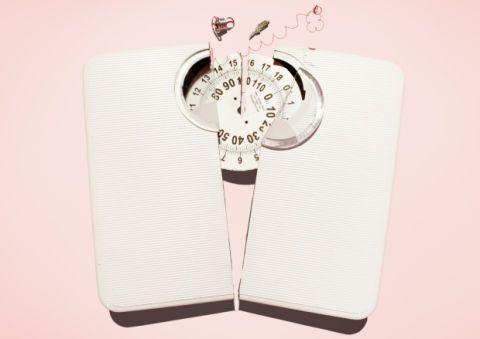12 Reasons You Are Having Trouble Losing Weight

12 Reasons You Are Having Trouble Losing Weight
You’ve done it all but still, you haven’t reached that most-coveted number on the scale. Shouldn’t weight loss be easy? All you have to do is follow a diet plan, maintain an exercise routine, and enjoy the rewards. However, losing weight only sounds easy in theory because in reality, it is not always that simple. Sometimes you shed some pounds off for the first few months, and then reach a plateau that is so hard to get out of. Indeed, it can be very frustrating but find comfort in the fact that it is not also uncommon. This further implies that there is something that you can do to start losing weight again. You just need to find out why you are stuck on the scale in the first place and what you can do to manage it right this time. Just don’t forget that weight loss is both a process and a journey where, in order to reach your goal, you have to be patient, committed, and be willing to make the necessary lifestyle changes.
Are you ready to lose weight, build muscle, or feel more fit? Join Beachbody On Demand, and get unlimited access to Beachbody’s world-famous programs, including 80 Day Obsession, 21 Day FIX®, Insanity, P90X® and 100’s more. Don’t miss out on your chance for amazing results. Sign up today!
A healthier, happier, and more energetic you is worth all the effort needed to lose weight. Here are 12 reasons to check out why losing weight is such a struggle for you.
- Not eating enough food
It may surprise you but not eating enough could be the main culprit for your weight loss struggle. Keep scrolling up your news feed and you will see how social media can influence you to go for low calorie or elimination diets that are depicted to work. However, what they are missing out on is the undeniable fact that food is actually fuel. You do need the calories to live your everyday life and it includes the often disregarded value of carbs and fat in them. Fact is, you need calories too to shed those pounds away in a healthy manner. Dr. Ethan Lazarus is an Obesity Medicine Association board member and he explains how your body weight gets regulated by several systems and starving yourself only ends up in you activating your own body’s protective systems so that it can defend your current body weight.
Dropping your metabolism at its lowest possible is one of these defense mechanisms and you know what happens when your metabolism is low – you stop losing weight. Dr. Ethan recommends that unless you are under medical supervision, you should eat enough and keep your calories above 1,200 each day.
- Spending too much time sitting or doing nothing
Yes, you workout on a regular basis but if you want optimal results, you have to make an effort to make any form of movement while you are not working out. Dr. Spencer Nadolsky is an American Board of Obesity Medicine diplomate and he espouses that what truly matters in weight loss it the total amount of activity that you have daily. Just because you exercise for 30 minutes to 1 hour does not mean that you have already moved yourself away from the sedentary category. The International Journal of Behavioural Nutrition and Physical Activity published a research that showed that those who exercise regularly tend to spend the same amount of time just sitting down with those who have skipped their workout routine.
Dr. Spencer prefers it that you take what he calls “exercise snacks” throughout your day and these are chunks of movements that you can do. Once in every hour you can make an effort to move and do something, anything that requires movement instead of just sitting down. You can walk around, perform one set of body weight exercise, or do some standing stretches. A walking meeting is also a nice idea or using the stairs instead of the escalator to go up or down the building.
- Eating less to zero carbs, protein, or fat
Dr. Julie Ellner is a bariatric surgeon in San Diego and she insists that it doesn’t matter whether you are trying to lose weight or not. The calories you consume have to come from a healthy diet combination that composes carbs, proteins, and even fats – contrary to what fad diets often promote. Raw vegetables, fruits, and legumes are whole food sources of unrefined carbohydrates and they are of utmost importance to keeping your energy levels up and fueling your intense workouts. The thing about these unrefined carbs is that they help in making you feel full for longer compared to bread or other refined carbs due to its fiber content. So the more you have them, the less cravings you will have to gorge on unhealthy snacks.
Moreover, the lesser you consume carbohydrates, the less the body is able stock up on glycogen which is the stored form of the glucose that is your body’s primary source of fuel. This could explain the weight loss that was previously reflected on the scale. It could simply have been a reduction in your water weight because a gram of glycogen gets stored with 3 grams of water. Because you have skipped your carbs, the body also has less stocks of the glycogen with the water and for a while there, it looks like you have lost weight. Remember though that your ultimate goal is fat loss and not water weight reduction. You need to progress from just losing water weight towards real fat loss so you can get past that plateau.
Another adverse effect of cutting too far back on your carbohydrates is decreased energy levels. And you know that if you are trying to lose weight, then you have to have both proper diet and exercise. So how can you have the energy and motivation to work out when you are feeling sluggish and tired? You are diminishing your intense workout capacity and active lifestyle when you do not fuel up with unrefined carbs. In the same way, your body needs fat and protein too. Aside from making you feel full longer, fat helps in regulating your hormones while protein helps in building the lean muscles that Dr. Julie identifies as the primary determinant factor that drives your metabolic rate. If you have more lean muscle mass, then your metabolism will also be faster.
- Not paying enough attention to your body
Your body is your best friend when it comes to weight loss and you have to listen to it if you want to succeed. Often times, it will send cues your way that you need to pay attention to including hunger and satiety. Dr. Julie explains that there are so many critical things that your body is telling you and you have to know how your body is feeling with each bite you make because it reveals a lot as to how much food you need and which types of food give you that good feeling of energy instead of fatigue. As such, she recommends that you eat only when you’re slightly hungry and stop as soon as you feel slightly full. A 2014 review by the Public Health Nutrition that such kind of intuitive eating works best as a tactic for maintaining your current weight but when it comes to weight loss, the same strategy has resulted in improved physical health, mental health, and body mass index. As you would often hear, moderation is the key because too much of anything including too much hunger or too much satiety is bad for you.
Conversely, do not wait till you are too hungry to grab some food because you will certainly eat more or go out of control once you are very hungry. And don’t just keep eating till you’re overly full. Practice mindful eating and it will be like discipline towards healthier eating habits. To make mindful eating possible, avoid all sorts of distractions from your TV, mobile phone, or computer and hone in on your feelings of satiety. In addition, should you find yourself in the kitchen unknowingly, ask yourself first if you are really hungry or you just want to eat because you are bored, stressed, or it has simply become part of your habit. It could also be because you are thirsty and not really hungry. Before you open your snack drawer, check your agenda first so you do not fall for eating for the wrong reasons, binge eat, or develop unhealthy eating habits.
- Doing cardio exercises only
What is the first exercise machine that you go to when you want to lose weight? Definitely, it’s the treadmill as weight loss is attached to sweating it out and running on the treadmill. However, most people also dread the treadmill for a lot of reasons and if you hate your workouts, you will have a hard time sticking to them. The good news is that, you can shift your mind into thinking that steady-state cardio workouts are the only way and realize that focusing on strength training will help you shed more pounds. The Harvard School of Public Health conducted a large-scale longitudinal study and what they found is that those who did strength training for 20 minutes each day gained much lesser belly fat over a 12-year period in comparison to those who did their 20 minutes daily doing cardio.
Dr. Ethan makes it clear how even if you follow a healthy weight loss diet with enough protein, you will not lose 100% of the fat. What you will lose is only part body fat and part muscle or lean body weight. Because of this lean body weight losses, your metabolism can slow down. As such, any form of strength training that you can do is important in preserving that lean body weight and accelerating your metabolism. Think about all the exercises that you can do with weights together with Pilates, yoga, or other resistance-based workouts. Weight training is like turning your body into a bigger engine that burns more gas to get you going around town. This is not to say that you have to ditch cardio exercises altogether as it can still be a part of your workout routine but to make weight loss a reality, you have to include weight lifting and body weight circuits to your routine several times each week.
- Not tracking how much you eat
Tracking anything can be daunting and this includes tracking your food intake. Dr. Spencer has noticed that when people start tracking their food intake the first time, they get shocked realizing what they’re really eating for the day. Just when you thought you are eating right, you are actually eating more. You do not really have to do your food tracking for the rest of your life but doing it religiously for a week can really give you a perspective that will push you to the right direction. It will help you see whether you are consuming extra calories or having too much sugar. Don’t forget that those small bites you have while cooking or when your coworker is snacking, all add up so track everything.
A good practice at this point would be to write them down on a food journal or tracker and add a section where you can put some notes. Here you can assess and take note of how you feel before enjoying your meals and give you insights as to how your food schedule, energy levels, and emotions affect what and how you eat. To illustrate, Wesley Delbridge, R.D. of the Academy of Nutrition and Dietetics suggests that you look into your day closely. A journal entry can say how you ran to the vending machine for some candy because you had to work through lunch to comply with a deadline and noticed yourself shaking from a blood sugar crash. When you review your food tracker or journal, you can then create a planned strategy to avoid the same thing from happening and bring packed lunch with you or order food ahead of time.
In case tracking your food and counting your calories is impossible for you, you can try Beachbody’s Portion-fix Eating Plan. The Portion-fix helps you calculate your total daily calorie requirements and makes it easier for you to stick to them using a portion-control container system that is color-coded for convenience. All you have to do is consume the same number of containers that were prescribed according to your daily calorie range. This way, you do not have to count calories or track your food on your own. It is important not to slash calories down to lesser than what is recommended for you. You will not accelerate weight loss this way because as mentioned earlier, when you do not eat enough, your body will only compensate for the calorie deficit by slowing down your metabolic rate. The key is to allow just enough calorie deficit to let your body burn through its fat stores.
- Not checking your overall health condition
One of the reasons why you are having trouble losing weight can be tied to your health condition. You may not know it but most medical conditions cause weight gain or make losing weight almost impossible. Hormonal imbalances, thyroid problems (like Hashimoto disease), and PCOS or polycystic ovary syndrome are all examples of such medical problems. Meanwhile, food intolerance or allergies that are hidden can also make it hard for you to lose the excess pounds.
As such, it is important to check on your health first before you dive into any weight loss program. Make sure you are healthy enough and do not have any intolerances or illnesses that you do not know of that will hinder you from getting to your goals. Besides, even if the medical problem itself is not contributing to your weight gain, certain medications have side effects that can pile up on your weight. At the end of the day, consulting with your physician is the best move to take when you are struggling with losing weight.
- Changing your lifestyle too abruptly
At first, the excitement of finally being able to lose weight can motivate you to make all sorts of changes in your lifestyle. This is a great start but remember that weight loss is both a journey and a process. Making changes too abruptly can result in a disaster when you are not ready. Adhering to your weight loss plan means making changes to your diet and increasing the time you spend for physical activities. You have to shop for healthier foods, learn to cook new recipes, walk instead of ride or drive, adjust your schedule to include gym time, wake up earlier to do some exercises, fight cravings for junk food and desserts, drink more water, and get enough rest. The list can go on and it illustrates how a lifestyle change to a healthier you is not simple and can even be overwhelming when you do them all at once. You can be confronted by feelings of frustration, anxiety, and fatigue.
This is why you have to work on developing sustainable habits as a gradual approach if you want the change to be long lasting. The Health Behavior Research Centre at the University College London had their experts make a review and what they found to be critical to making sustainable lifestyle changes is habit formation. This is especially true when you have the tendency to go on and off on your diets or have a history of yo-yo dieting. Achieving a healthier lifestyle requires making changes one factor at a time and sticking to that habit until it is fully cemented before moving on to the next one. You can make a list of the changes that you intend to make and it can include eating veggies twice a day, intensifying your workout program, cutting off on all kinds of soda, increasing your movements throughout the day, and many more. Just remember to make a habit of each one of them until it becomes a complete lifestyle change.
- Not sleeping soundly enough
You may consider yourself a super hero with your ability to get by without enough sleep but that’s exactly the point. You just get by but never really thrive and you don’t know until when you will be able to because your health is sure to suffer and one day, your body is simply going to give up. If you are trying to lose weight and you follow the same sleepless routine then you are bound to fail. Dr. Ethan explains how when you sleep, your body fat makes adiponectin and leptin which are two very important hormones. Adiponectin is the hormone that ensures your body is able to respond to insulin better while leptin is the hormone that best suppresses appetite in a natural manner. This is the kind of scenario which facilitates weight loss.
On the other hand, when you do not have enough sleep and you are dieting and feeling tired, then you are sure to feel hungry and will start to crave for carbs. A small study was conducted on dieters and the group of dieters who slept for 5 and half hours only experienced less weight loss at 55% and saw a decrease in their lean body mass in comparison to the group of dieters who had 8 and a half hours of sleep. What the National Sleep Foundation recommends is that adults like you from 18 to 64 years old benefit from 7 to 9 hours of sleep each night. If you consistently do not get this amount of sleep then it is time for you to make it a priority. Remember that 35% of American adults do not get as much sleep based on the data from the U.S. Centers for Disease Control and Prevention.
Sleep is not negotiable whether you are losing weight or not but especially so if you are aiming to shed those unwanted pounds off for real. You do not sacrifice sleep because you are busy. Instead, plan your sleeping hours, establish a regular schedule, and stick to it no matter what. Set yourself up for sleep success by scheduling everything else that you need done around it.
- Having too much sugary drinks
It’s easy to make having a sweet tooth as an excuse for craving desserts but having sugary drinks instead is committing almost the same crime when you are working on reducing your weight. Remember that fluids also impact your calorie count and you have to take note of what you drink if you want to eat and drink cleanly. If you are used to grabbing your tasty coffee each morning or iced latte in the afternoon, you may need to rethink that habit as without you noticing it, you are already adding to your calorie intake. Sugary drinks, especially carbonated ones, are your worst enemies and it can include smoothies, fruit juices, soft drinks, and of course, drinks with alcohol content.
At this point, it is important that you learn to substitute these sugary concoctions and enjoy black coffee with no sugar, fat-free milk on your hot drinks, and going for lower calorie spirits such as vodka and gin. You do this and you will be able to avoid adding to your calories. Also keep in mind that even if it says “diet”, carbonated drinks are simply bad for your diet and harmful on your waistline. Diet sodas or sugar-free ones still affect your cravings for sugar and this is despite having the zero-calorie label.
- Having unrealistic expectations when it comes to weight loss
If there is anything that can frustrate you deeply, it would be unrealistic expectations. When it comes to weight loss, you have to keep your expectations healthy and realistic in order to achieve long-term success. This translates to being very patient with the results and realizing that you did not put on all those extra weight in a matters of weeks or months only but mostly, years. As such, it is unrealistic to just lose all of that in a few weeks or months. Realize too that there is nothing wrong with going through this process because shedding those extra pounds off is supposed to take time when you want to lose the healthy and sustainable way – patience is the key.
Another way to make it realistic is not to solely depend on the numbers that you see on the weighing scale. You might not be actually losing weight as quickly as the scale would reflect but what you don’t see is your body composition changing. Most scales are not able to reflect in an accurate manner how much you have lost when it comes to your body fat and how much you have gained in muscle mass. In this case, it is important to take some before and after photos and take your measurements to help you see your progress more realistically. When you’ve lost some body fat, you will also notice it in your clothes and how they fit especially when you take before and after photos. Patience is not a value that dieters have as many would get discouraged when they don’t see immediate results. But if you are determined to succeed, do not change your regimen instantly or give it all up altogether. Just keep going and give it time until you see the results that you want.
- Not making enough physical effort
Walking, biking, jogging help you burn calories but your metabolism can just go back to normal afterwards. This is the reason why you might need to consider high-intensity exercises to up your metabolic conditioning. Beachbody has programs like 22-minute Hard Corps and CORE DE FORCE to help you maximize your weight loss efforts. You are bound to burn more calories every minute when you do these types of workout and most importantly, your metabolism also stays at an elevated level for days and not just hours. In addition, high-intensity workouts also help curb your appetite.
Are you ready to lose weight, build muscle, or feel more fit? Join Beachbody On Demand, and get unlimited access to Beachbody’s world-famous programs, including 80 Day Obsession, 21 Day FIX®, Insanity, P90X® and 100’s more. Don’t miss out on your chance for amazing results. Sign up today!






